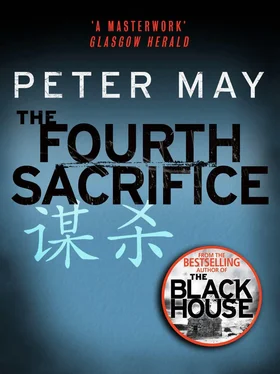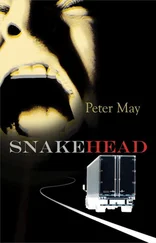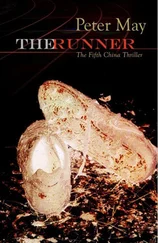Peter May - The Fourth Sacrifice
Здесь есть возможность читать онлайн «Peter May - The Fourth Sacrifice» весь текст электронной книги совершенно бесплатно (целиком полную версию без сокращений). В некоторых случаях можно слушать аудио, скачать через торрент в формате fb2 и присутствует краткое содержание. Год выпуска: 2012, Издательство: Quercus, Жанр: Триллер, на английском языке. Описание произведения, (предисловие) а так же отзывы посетителей доступны на портале библиотеки ЛибКат.
- Название:The Fourth Sacrifice
- Автор:
- Издательство:Quercus
- Жанр:
- Год:2012
- ISBN:нет данных
- Рейтинг книги:4 / 5. Голосов: 1
-
Избранное:Добавить в избранное
- Отзывы:
-
Ваша оценка:
- 80
- 1
- 2
- 3
- 4
- 5
The Fourth Sacrifice: краткое содержание, описание и аннотация
Предлагаем к чтению аннотацию, описание, краткое содержание или предисловие (зависит от того, что написал сам автор книги «The Fourth Sacrifice»). Если вы не нашли необходимую информацию о книге — напишите в комментариях, мы постараемся отыскать её.
The Fourth Sacrifice — читать онлайн бесплатно полную книгу (весь текст) целиком
Ниже представлен текст книги, разбитый по страницам. Система сохранения места последней прочитанной страницы, позволяет с удобством читать онлайн бесплатно книгу «The Fourth Sacrifice», без необходимости каждый раз заново искать на чём Вы остановились. Поставьте закладку, и сможете в любой момент перейти на страницу, на которой закончили чтение.
Интервал:
Закладка:
Later, in the washroom, he had examined his face in the mirror, shocked to see how clearly the shape of her hand was left on his cheek, red and raised. And as he touched it again now, it made a kind of connection between them, like touching her.
He finished his cigarette and flicked it out of the open window, watching a shower of orange sparks fly up from it briefly as it hit the ground below. He turned and looked at the file Qian had left on his desk. Here was an enigma. All the evidence pointed to Yuan being the fourth victim of the same serial killer. And yet Margaret had concluded that it was a copycat killing, that Yuan had been murdered by someone else. How could he doubt her assessment? She was a practised professional with enormous experience. But still he knew that no one other than his own detectives and the killer himself could possibly know enough to duplicate all the tiny details.
He had made a preliminary report on the findings of the autopsy to a packed meeting of the detectives working on the case. A number had been dismissive of Margaret’s conclusions. Left-handed, right-handed, they said, was a minor detail. As was the change from wine to vodka as a carrier for the flunitrazepam. Li pointed out that the severing of the head had also been less cleanly performed. Sang had suggested that perhaps the killer had deliberately made changes to his modus operandi in order to confuse the investigation, and a switch from right hand to left would explain why the cut had been less clean. No one believed these details to be of much importance compared to the number of identical features. But Li knew that Margaret believed them to be important, and his uncle had always said that the answer invariably lay in the detail.
Now he sat down at his desk and switched on an anglepoise lamp which spilled light across its surface. He looked at the buff folder in front of him. A man’s life lay within. Perhaps, also, a reason for his death. He opened it. Inside were duplicates of official documents: medical reports; education history in the United States; Yuan’s own curriculum vitae; his application for citizenship; an official report collated by some government agency on his political background; the assessment of his oral examination on application to join the State Department; the results of the State Department’s own security checks and medical examination. Li shuffled back and forwards through the documents, piecing together Yuan’s history.
Yuan Tao was born in 1949, the year of the birth of the People’s Republic. The year of the Ox. The same year as all the other victims. They were, all of them, children of the Revolution, progeny of the Liberation.
He had left China at the age of seventeen, in May of 1966, just under a month before the start of the Cultural Revolution, whose beginning was marked, in most people’s minds, by the suspension of classes at schools and universities across the country on 13 June. He had got out just in time, granted an exit visa to go to Egypt to study physics at the University of Cairo. But that had been a subterfuge, for he had spent less than a month in Cairo before flying on to the United States, where he had been accepted on a degree course to study political science. His sponsor was an uncle who had fled from China to San Francisco in 1948. Yuan had spent the summer working in his uncle’s restaurant in the city’s Chinatown to help pay his tuition fees when he started at the University of California, Berkeley, in the fall.
These had been turbulent years at Berkeley, with student civil rights demonstrations, and protests over the Vietnam War. Li shuffled in vain through the papers in the file searching for the report the FBI would surely have compiled on Yuan Tao at that time. He had known, of course, it would not be there. Just as there was no report of the CIA’s certain attempt to recruit him.
Yuan completed his doctorate in political science in 1972, but stayed on for another two years to finish a post-doctorate thesis. In 1974 he applied for and was offered the post of assistant professor of political science at Berkeley and immediately applied for his Green Card. His application was successful, allowing him to accept the position.
Yuan rented an apartment in Oakland, right across the bay from San Francisco, and close to the university. In 1978 he was promoted to associate professor, and the following year applied for and was granted naturalisation. Then, as an American citizen, he had married another Chinese-American in 1979. But the marriage had lasted less than two years, and was childless. Two years later, in 1983, he had become a full professor, and over the following years had proceeded to slip quietly into early middle-age in the cloistered backwaters of Californian academia.
Then, in 1995, at the age of forty-six, and completely out of the blue, he had applied for a job in the State Department. Certainly, they would have been pleased to receive him, an ethnic Chinese professor of political science, a naturalised American citizen who spoke fluent Mandarin. And Yuan Tao’s life had taken a totally different turn.
He had moved to Washington in the following year. But the papers provided by the Americans gave no clue as to what work he had been involved in there. Then in 1999, he had astonished his employers by applying for a posting to the US Embassy in Beijing when a lowly vacancy had arisen on the visa line. Several internal memos expressed consternation, and a letter had been sent to him suggesting that his abilities would be better employed elsewhere. There was no record of his response, and his application had duly been granted, with reluctance.
Yuan Tao had finally arrived back in China six months ago to take up his job in the visa department at the Bruce Compound at the top of Silk Street.
Li lit a cigarette and watched the blue smoke curl lazily through the light of his desk lamp. A series of facts. A chronology. None of which told him the first thing about the man. Who was he really? What were his hopes and fears? Who did he love, who did he hate, and who hated him? Why had he never returned to his homeland in the early years after the Cultural Revolution when it would have been safe for him to do so? And then why, after thirty-four years, had he suddenly decided to come back after all?
Li’s thoughts turned to the apartment at No. 7 Tuan Jie Hu Dongli. Why had Yuan wanted to rent when the embassy provided accommodation? And what had he hidden under the floorboards there that only his killer could have taken? The answers, Li was sure, would not be found in his file.
He wondered how Yuan had felt, returning to the country of his birth thirty-four years after he left it. What incredible changes there had been in that time. China must have been unrecognisable to him, a foreign country. Had he sought to make any contact with relatives? For surely there would be some, somewhere. Li flipped through the pages, coming to the only reference he could find to Yuan’s parents. His father had been a teacher, and died, apparently, in 1967. His mother had worked with pre-school children in kindergarten, but there was no record of what had become of her. And then there must have been old school friends. In six months he must have made contact with someone.
It was in Yuan’s own résumé that Li finally found what he was looking for. A list of his academic qualifications. He ran his finger down a reverse chronology, stopping finally at the second-last entry, and all the hairs stood up on the back of his neck. Yuan Tao had graduated from the No. 29 Middle School in Qianmen in May of 1966.
Li sat staring blankly at the sheets in front of him for several minutes. The murder victims had all attended the same school.
The revelation cast for the first time, in his mind, a shadow of doubt over Margaret’s conclusions at the autopsy. For it inextricably linked all four. They had all been doped with the same drug, all had their hands tied behind their backs with the same silk cord. They had all had placards placed around their necks, their nicknames written upside down and crossed through. The placards had been numbered in sequential descending order from six. They had all been beheaded — the first three with a bronze sword — and Li had no doubt that forensic results would confirm this to be the case with the fourth.
Читать дальшеИнтервал:
Закладка:
Похожие книги на «The Fourth Sacrifice»
Представляем Вашему вниманию похожие книги на «The Fourth Sacrifice» списком для выбора. Мы отобрали схожую по названию и смыслу литературу в надежде предоставить читателям больше вариантов отыскать новые, интересные, ещё непрочитанные произведения.
Обсуждение, отзывы о книге «The Fourth Sacrifice» и просто собственные мнения читателей. Оставьте ваши комментарии, напишите, что Вы думаете о произведении, его смысле или главных героях. Укажите что конкретно понравилось, а что нет, и почему Вы так считаете.












